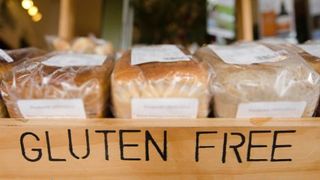Gluten-Free Foods Are Not Healthier, But They Are More Expensive
New research compared regular foods to their GF alternatives and the results are not good for GF

Unless you’re a massive fan of crackers, eating gluten-free (GF) alternatives to regular foods is a less healthy and far more expensive option, according to new research from the University of Hertfordshire.
The study, published in the Journal Of Human Nutrition And Dietetics, compared 1,724 food products across ten categories, looking at their nutritional content and cost. With the exception of the cracker category, GF alternatives were found to contain more fat, salt and sugar, and less fibre and protein, than their gluten-containing counterparts.
We should make clear at this point that GF foods are without doubt the healthier choice for people with coeliac disease – going GF is the only treatment option available. However, if you do not suffer from coeliac disease or a sensitivity to gluten that has been diagnosed by a medical professional, the study suggest there is no nutritional advantage to eating GF foods. Quite the opposite, in fact. The median total fat content of GF white and brown bread products, for instance, was more than double that of regular bread.
See related
Eating GF will also hit your wallet hard, with the study finding that GF foods were 159% more expensive than their regular equivalents. For those opting for a GF diet as a lifestyle choice that’s an expense they can choose to swallow or not, but for sufferers of coeliac disease it’s a far more significant issue, because it could make it harder to maintain a GF diet.
"We found that gluten-free foods were significantly more expensive than regular items, which is very concerning given the movement towards stopping gluten-free prescriptions for people with coeliac disease,” said Dr Rosalind Fallaize, research fellow in nutrition and dietetics at the University of Hertfordshire.
The difference between GF and regular bread stood out, with the median cost of GF white and brown bread found to be over four times that of regular equivalents.
In March last year a Harvard University study of more than 200,000 people tracked over 30 years found that those who ate the most gluten had a 13% lower chance of developing type 2 diabetes than those who ate the least. Although that was an observational study, so it didn’t prove a link between low-gluten diets and a greater risk of type 2 diabetes, it suggested that sticking with gluten still seems to be the smart choice unless you’re coeliac, if only to help you get enough fibre in your diet.
Get the Coach Newsletter
Sign up for workout ideas, training advice, reviews of the latest gear and more.

Nick Harris-Fry is a journalist who has been covering health and fitness since 2015. Nick is an avid runner, covering 70-110km a week, which gives him ample opportunity to test a wide range of running shoes and running gear. He is also the chief tester for fitness trackers and running watches, treadmills and exercise bikes, and workout headphones.
